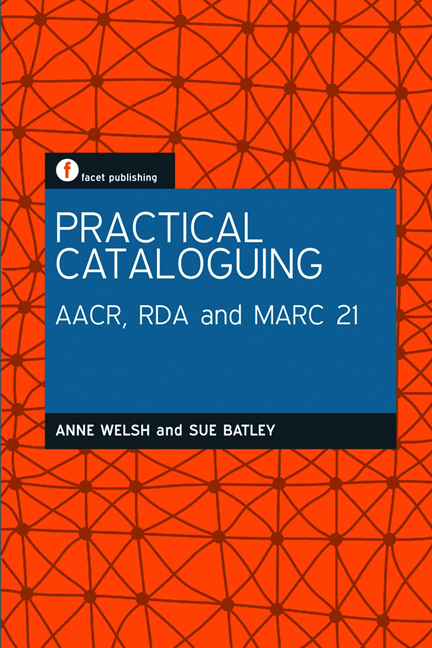Book contents
- Frontmatter
- Dedication
- Contents
- Acknowledgements
- Preface
- 1 Catalogues and cataloguing standards
- 2 The FRBRization of the catalogue
- 3 Bibliographic elements
- 4 Access points and headings
- 5 RDA: resource description and access
- 6 AACR and RDA
- 7 MARC 21
- 8 Practical cataloguing: bringing it all together
- 9 The birth of RDA and the death of MARC?
- 10 Examples
- References
- Index
5 - RDA: resource description and access
Published online by Cambridge University Press: 08 June 2018
- Frontmatter
- Dedication
- Contents
- Acknowledgements
- Preface
- 1 Catalogues and cataloguing standards
- 2 The FRBRization of the catalogue
- 3 Bibliographic elements
- 4 Access points and headings
- 5 RDA: resource description and access
- 6 AACR and RDA
- 7 MARC 21
- 8 Practical cataloguing: bringing it all together
- 9 The birth of RDA and the death of MARC?
- 10 Examples
- References
- Index
Summary
This chapter covers the history of the new code, picks up on some of the changes indicated elsewhere in the book, and finally offers practical advice for libraries and other cataloguing agencies considering if, how and when they should make the change from AACR2 to RDA.
Timeline to change
Let us start with the simplest narrative – the administrative history of the new code. The history of RDA is outlined on the Joint Steering Committee (JSC) website at www.rdajsc. org/rda.html#background, and referenced in most publications on the new code, including Chris Oliver's recent book Introducing RDA: a guide to the basics (Oliver, 2010).
RDA grew out of the process begun in 2004 to produce the next edition of the AngloAmerican Cataloguing Rules. Following the circulation of the draft of the first part of AACR3, it was decided in 2005 that a new approach was needed, and work began under the title RDA: resource description and access.
Between 2005 and 2009 various drafts of the new code were circulated for constituency review, and members of the cataloguing community around the world offered feedback and opinions.
A key shift between AACR2 and RDA is the new code's conception as a digital product. In June 2010, the RDA Toolkit was presented to the world, with a free trial period of just over three months. Later in 2010, a paper version of RDA was published, in response to demands from the community, and particularly from smaller institutions which could not afford the annual subscription to the online product. However, throughout the process, the JSC has stressed that RDA is not a paper product, and full understanding (and updates) is available only through the online version.
One impact of the transparency of the processes around the creation of the new code is an awareness on the part of the worldwide cataloguing community that it has not yet been decided when the major AngloAmerican cataloguing agencies – the Library of Congress and the British Library, will adopt the code. Because the processes preparing for previous codes were more closed, the average cataloguer in the stacks did not feel the need to engage with them until the Library of Congress and the British Library were beginning to implement them.
- Type
- Chapter
- Information
- Practical CataloguingAACR, RDA and MARC 21, pp. 83 - 104Publisher: FacetPrint publication year: 2012



